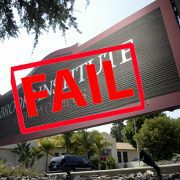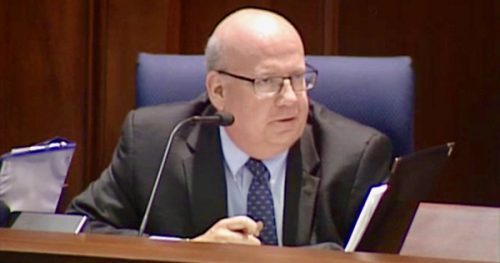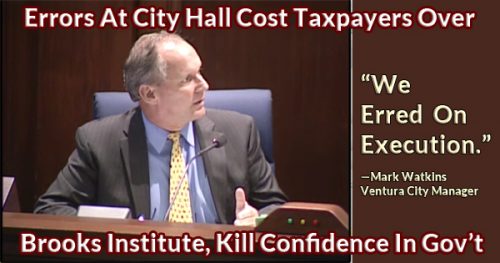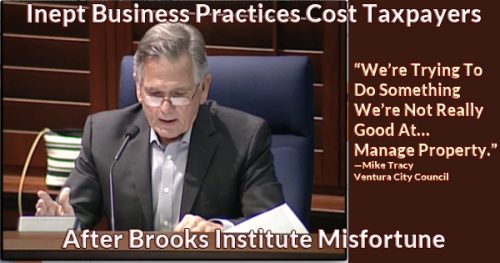The City Should Get Out of the Property Rental Business

“We need leadership. We don’t need a doubling down on the failed politics of the past.” —Paul Ryan

505 Poli building. Crime lab in the lower right corner.
City Council Makes The First Step Toward Dealing with Surplus Building
To get realistic information for the City Council to decide about 505 Poli, Councilmember Mike Tracy presented a motion to seek advice from a licensed commercial realtor. Councilmember Jim Monahan seconded the motion. The Council unanimously agreed after City Attorney evaluated the right to sell the property, to seek advice from a licensed commercial realtor. The goal is to “determine (the) value of 505 Poli Street including the Crime Lab (appraisal and parking analysis study). Then to decide on disposition (of the property).”
Good decision.
Why The City Should Get Out Of The Property Rental Business
The 505 Poli building adjacent to City Hall exemplifies why the City of Ventura should not be in the property rental business. The city owns several properties. Ventura needs some to house various city departments and needs others for future use. However, the city owns and operates some for the sole purpose of generating income — rental income property.

Citizens have a right to expect the city to manage 505 Poli wisely.
When public money is used to buy rental income property, citizens have a right to expect the city will manage the investment wisely. Acquiring and operating such property requires knowledge and expertise to protect the investment. In the case of our city, the City Council makes the decisions. They rely on the City Manager and city personnel for sound advice.
Here’s the rub. Ventura city personnel have demonstrated historically—and continue to show, as we will later explain—that they do not have the knowledge or experience needed to assist the City Council in making decisions in such matters.
Why The City’s Bad At Property Rental
There are four major issues with city-owned rental income property:
First, the daily maintenance and management of these properties require constant attention. Buildings cost money to operate with or without a tenant and thus are a continual liability and drain on public resources. Private owners use qualified property managers to manage their property. If those managers are not able to produce any income to the owner after expenses, the owner fires them.

Should Ventura be in the property rental business at all?
Second, the city does not have a structured professional approach to operations and tenant management. It is merely an additional task for someone in some department to look at in and among all of their other daily tasks, which staffers usually place behind the immediate problem of the day. Income property must be monitored and requires constant professional attention. Fail in that task, and the supposed investment will fail. The Brooks Institute rental at 505 Poli was a debacle and is the perfect example of why the City Council should not rely on city staff for help in trying to operate such property. Still, they persist.
Third, properties are acquired and operated long past their usefulness to our city. Once the city uses taxpayer money to pay for the property, the City Council and city staff blot the investment out of their minds. If the property is not producing the expected income or outlived its purpose, it should be placed on the market and sold. To spend taxpayer’s funds without any concept to how much the city has already spent on past failed projects for the same property is wrong.
Finally, the City believes that it is acceptable to compete with private free enterprise and offer free rent or discounted rent for city-owned buildings and property acquired with taxpayer money. Private property owners are encouraged to invest in Ventura, but why would anyone make such an investment when the City is a major competitor? It is unfair competition and constitutes a misuse of taxpayer’s funds.
The City Council needs to address these problems.
505 Poli Confirms That Ventura Is Bad At The Property Rental Business
Appraised for $3.55 million in Sept. 2005, the City of Ventura acquired it in November 2006 for $4.03 million. Our then-City Manager pushed the acquisition. The Council followed his advice. To fund the purchase $1.23 million in General Funds were used together with another $2.8 million from a particular service fund — Workers Compensation Fund. The use of the Workers Comp funds should have been a warning to the City Council. That fund pays for future worker’s compensation claims. The interim City Manager, Johnnie Johnson, exposed that budget manipulation when he advised the City Council in 2012 of a $5 million deficit.
Just why the City Council thought “robbing Peter to pay Paul” was a good idea defies logic.

Questions remain as to how much the city has spent to acquire, improve and maintain 505 Poli.
Then there is the building itself. The City accepted the premise—and the adjacent old County crime laboratory which was part of the deal—knowing that asbestos filled this old Ferro-cement structure. The removal of asbestos and hazardous material remediation in the crime laboratory alone was estimated to cost $500,000-$700,000. The list of deficiencies abounded—seismic conditions, old air conditioning systems, old electrical systems and a 60-year-old elevator that hinders tenant usage.
In 2006, City staff advised the City Council that if they decided to buy the property, the city would get a return from the investment in 6.3 to 8.8 years. There was no return on the investment. The building was repurposed to provide free or low rent to new tech startup companies. City staff reckoned that if the startups succeeded they would do business in Ventura and bring jobs to the community. The City Council allocated another $5 million for that purpose. However, aside from the single success of Trade Desk, the project failed.
Six years later, in February 2012, the Ventura Chamber of Commerce agreed to pay $1,000 cash per month for the first floor. In March & April 2013, the Trade Desk leased the 4th and 5th floors for $6,025 a month at which time the City Council spent another $62,750 in improvements. Trade Desk left and in Feb. 2016, the city then tried to lease the two top floors to Brooks Institute. Demolition proceeded on those two floors, and since Brooks Institute defaulted, those floors have been vacant. They remain empty today.
By this simple accounting, the City of Ventura has spent or is obligated to pay an additional $4.6 to $5.0 million with no net rental income to justify the investment over the last 12 years.
Spending More Money Won’t Fix What’s Bad About Ventura’s Property Rental
The latest proposal put forward by the Public Works Department recommends the city sink more money into the building. On April 16, 2018, the city staff recommended the City Council spend another $2.0 million to build tenant improvements on the 4th and 5th floor of 505 Poli. That report contained a lot of facts and figures but was notable for the lack of a feasibility study.
City staff suggested in the report were that if the City Council spends the money, 505 Poli would then be considered a Class A property rental property and would rent for $3 a square foot because of its downtown location. There was no rental comparison survey to support the plan. There was no vacancy survey included. The report also ignored the fact that vacancy is running at 25% citywide on commercial property. The entire argument assumes that if “we build it, they will come.” The recommendation also suggests our city would receive a monthly income of $53,413 after the improvements at 100% occupancy. Great promise, but it lacked facts and is unrealistic.
 Then something happened in the city staff presentation that further demonstrated how they lack the knowledge and experience to guide the City Council on rental properties. The Public Works presenter hinted a possible tenant would take the space and finance the tenant improvements in exchange for significantly reduced rent. Almost immediately, Jeff Lambert, the Community Development Director, corrected that information. The potential new tenant had pulled out earlier that week. There were no interested parties, at this time. It was apparent these two departments were not communicating, and the facts were not straight before asking the City Council to spend $2 million.
Then something happened in the city staff presentation that further demonstrated how they lack the knowledge and experience to guide the City Council on rental properties. The Public Works presenter hinted a possible tenant would take the space and finance the tenant improvements in exchange for significantly reduced rent. Almost immediately, Jeff Lambert, the Community Development Director, corrected that information. The potential new tenant had pulled out earlier that week. There were no interested parties, at this time. It was apparent these two departments were not communicating, and the facts were not straight before asking the City Council to spend $2 million.
Editors Comments
We recommend several things about 505 Poli and city-owned real estate in general.
First, the City Council should follow up on how much taxpayers have spent to acquire, improve and maintain 505 Poli. The total amount may surprise some of them.
Second, the City Council should hold the city staff to a higher level of thoroughness and professionalism before recommending spending taxpayer money.
Third, and most importantly, city government should get out of the property rental income business and find a qualified, reputable real estate company to lease and manage all city-owned rental property.
Insist The City Council Heeds The Input Of Outside Consultants Before Deciding What To Do On 505 Poli
Below you’ll find the photos of our current City Council. Click on any Councilmember’s photo and you’ll open your email program so you can write directly to that Councilmember.
Let them know what you’re thinking. Tell them what they’re doing right and what they could improve upon. Share your opinion. Not participating in government weakens our democracy because our city government isn’t working for all of us.
For more information like this, subscribe to our newsletter, Res Publica. Click here to enter your name and email address.
















































